Diet debate: Is butter back and is sat fat good?
- Published
Is butter back?
I love butter - a scraping of it on a slice of toast is a thing of joy.
So when a series of newspaper headlines declared saturated fat is not as bad as once thought and that "butter is back" then wow that's the kind of news story I can get behind!
But they do run against decades of health advice to cut the amount of sat fat we eat.
So what's going on here and what should make it into the supermarket trolley?
One of the big problems seems to be that simply declaring saturated fat is bad or that butter is back loses all nuance.
The World Health Organization's advice is to have no more than 10%, external of total calories coming from saturated fat.
The argument has been that sat fat increases the amount of bad cholesterol in the blood, although it also increases the good type too.
The bad cholesterol furs up arteries and ultimately leads to a heart attack or stroke. Meanwhile trials of statins show cholesterol-lowering drugs can reduce the risk of a heart attack.

More from our Diet Debate series:

Confusion?
But getting the best evidence in nutrition is always a bit of nightmare.
Some studies rely on food questionnaires asking people what they ate in the past year and then seeing what happened decades later. Now I can't tell you what I had for dinner three weeks ago and diets also change with time.
And it's ever so slightly unethical to lock people up and experiment with their diets for decades to see if they have a heart attack. So the evidence ends up being a patchwork quilt of studies that gives an overall impression that saturated fat is bad.
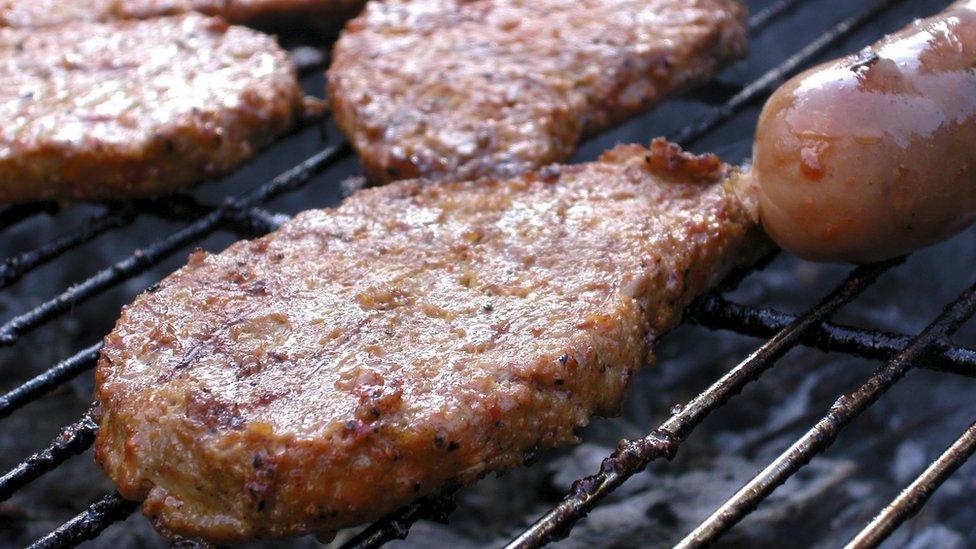
A barbecue is sat fat overload
Public Health England, which advises people to cut down on saturated fat, says one of the key pieces of science on which they base their recommendations on is a review of 15 clinical trials, external which changed more than 59,000 people's diets for at least two years.
However, even this starts to show why there can be confusion about saturated fat.
It showed no impact on deaths from heart disease or any other cause of dying.
And the analysis concludes that if you cut saturated fat out of your diet and replace it with carbohydrates or protein then it makes no difference to your risk of a heart attack.
Carbs, and especially the refined ones in white bread rather than the complex ones in vegetables or wholegrains, are as bad for you as the saturated fat we've been warned off for years.
It is only when saturated fats are replaced like-for-like by polyunsaturated fats that you see a significant reduction in heart attacks.
Dr Lee Hooper, who led the study at the University of East Anglia, said: "What we've realised in the last few years is that saturated fat isn't quite as much a villain as we thought."

Types of fat
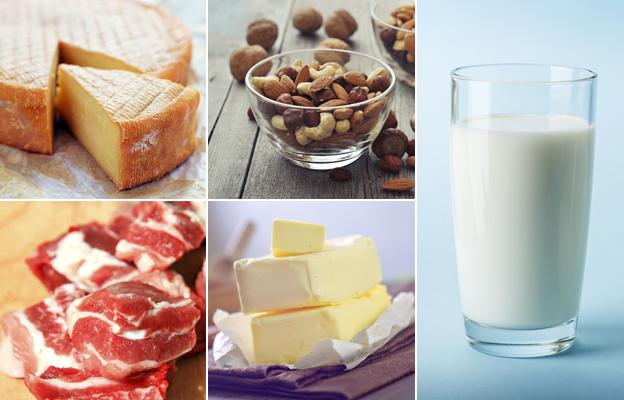
Saturated fat - Found in meats including processed foods such as burgers and sausages as well as butter, dairy and coconut oil
Monounsaturated fat - Found in avocados, olive oil, and many types of nut.
Polyunsaturated fat - Found in oily fish, vegetable oils and seeds.
Trans fat - Found in biscuits, cakes and margarines

I put it to Public Health England's chief nutritionist, Dr Alison Tedstone, that just telling people to cut saturated fat was too simplistic.
She was adamant that saturated fat is a bad thing in our diets but "it's a fair point that sometimes the fat message gets oversimplified".
Dr Tedstone continued: "The data over the years has flip-flopped slightly as new studies have emerged and that's because you're looking at subtle things on whether it should be monos or polys or wholegrain carbohydrate.
"I agree it's inappropriate to give the population messages to increase your carbohydrate intake without thinking about what that carbohydrate intake is."
The advice from both Drs Tedstone and Hooper is to cook in sunflower oil instead of butter and have a low-fat spread.
Butter's redemption?
But some have argued that even this is wrong and that butter and other foods rich in saturated fat belong in a healthy diet.
A study by the University of Cambridge in 2014, external is often quoted after it concluded there was no "clearly supportive evidence" for the guidelines that encourage cutting saturated fat from the diet.
It led to a flurry of headlines announcing that "butter is back".
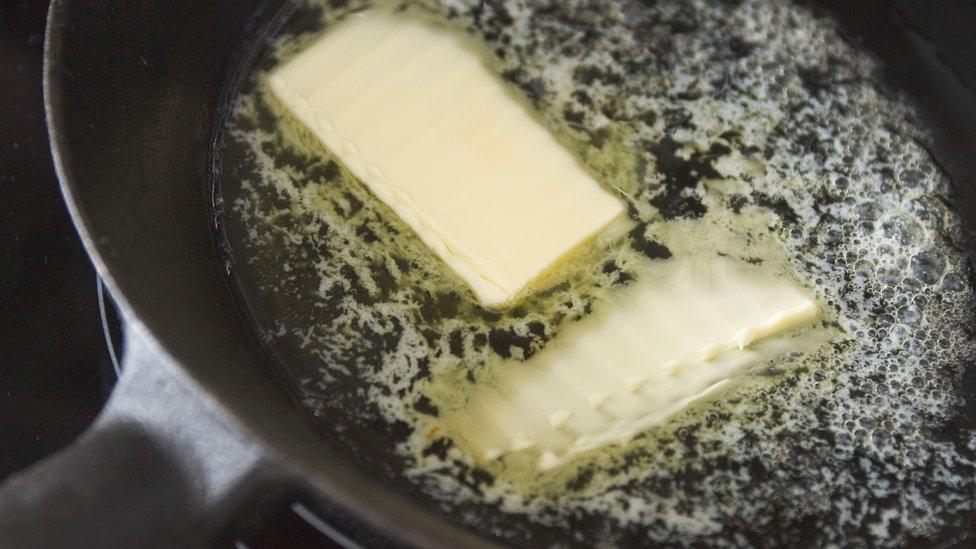
"That is an oversimplification, we never said that," one of the researchers Dr Nita Forouhi, from the MRC epidemiology unit at the University of Cambridge, told me.
The review did show no significant relationship between the amount of saturated fat, monounsaturated fat or a type of polyunsaturated fat and heart disease.
But Dr Forouhi warned there needed to be a stronger focus on not what should be cut from the diet, but with what it should be replaced.
The study could not take that into account.
She said saturated fat had become a "very, very reductionist debate" and warned people to "be careful about giving oversimplified messages".
But she is at the forefront of research that might transform the saturated fat debate, bringing some saturated fats in from the cold.
Are all saturated fats the same?
Once upon a time doctors thought all "cholesterol" was bad, until they discovered it came in both "good" and "bad" forms.
Well, now there is a growing realisation that not all saturated fats are the same and emerging evidence hints that some types may be beneficial.
A saturated fatty acid is a string of carbon atoms chained together, but the length of the chain varies.
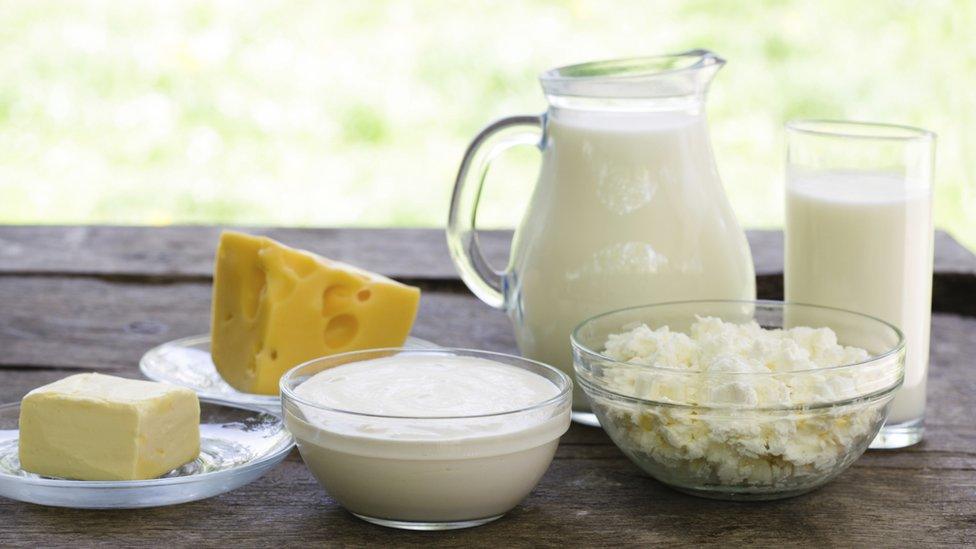
Saturated fatty acids range from those with four carbons (butyric acid) to those with 24 carbons (lignoceric acid). Common ones include palmitic acid (16 carbons) and stearic acid (18 carbons).
When you look at the levels of the different saturated fatty acids that end up in the blood then interesting patterns start to emerge.
People with higher levels of 16 and 18 carbon saturated fatty acids in the bloodstream had a higher risk of heart disease.
But those with more saturated fatty acids with a length of 15 or 17, which is linked to eating dairy, had a lower risk, external and the same pattern emerges in type 2 diabetes, external.
"These are very exciting findings and could really advance our understanding," added Dr Forouhi.
So-called "even-chain" saturated fatty acids such as those with 16 carbons come from dietary fat, but are also made by the body because of high intakes of refined carbs and alcohol.
So not only could refined carbs be having a negative effect on blood sugar levels, they could also be boost "bad" saturated fats in the blood.
The "odd-chains" come exclusively from the diet and notably from dairy products.
And Dr Forouhi added: "Our new findings may also help to explain the reports from studies that some types of dairy products may cut diabetes or heart disease risk, somewhat contrary to expectation."
But wait a minute - were all those headlines right? Should cheese, yoghurt, whole milk and butter should be firmly on the menu?
How healthy is your breakfast choice?
Dr Forouhi warned that it was dangerous to take her early evidence and make such pronouncements.
"We cannot assume that the beneficial effects of dairy products are solely from the 'good' saturated fatty acids, after all foods contain a combination of ingredients."
She warned there was still a "powerful link" between butter or saturated fat and bad cholesterol and more targeted studies should now take place on sub-types of saturated fat.
And specifically on butter she said that most scientific studies don't actually include it in their definition of dairy.
More research in this whole field is taking place, it could dramatically change our understanding of fat. Or equally it could come to nothing.
Dr Forouhi concluded: "While that research is going on I don't think we should just go changing everything.
"It's too premature to give the public the impression that they have a licence, based on this preliminary research, which is exciting but not yet definitive, to say butter is back."
Follow James on Twitter, external.
- Published5 January 2016
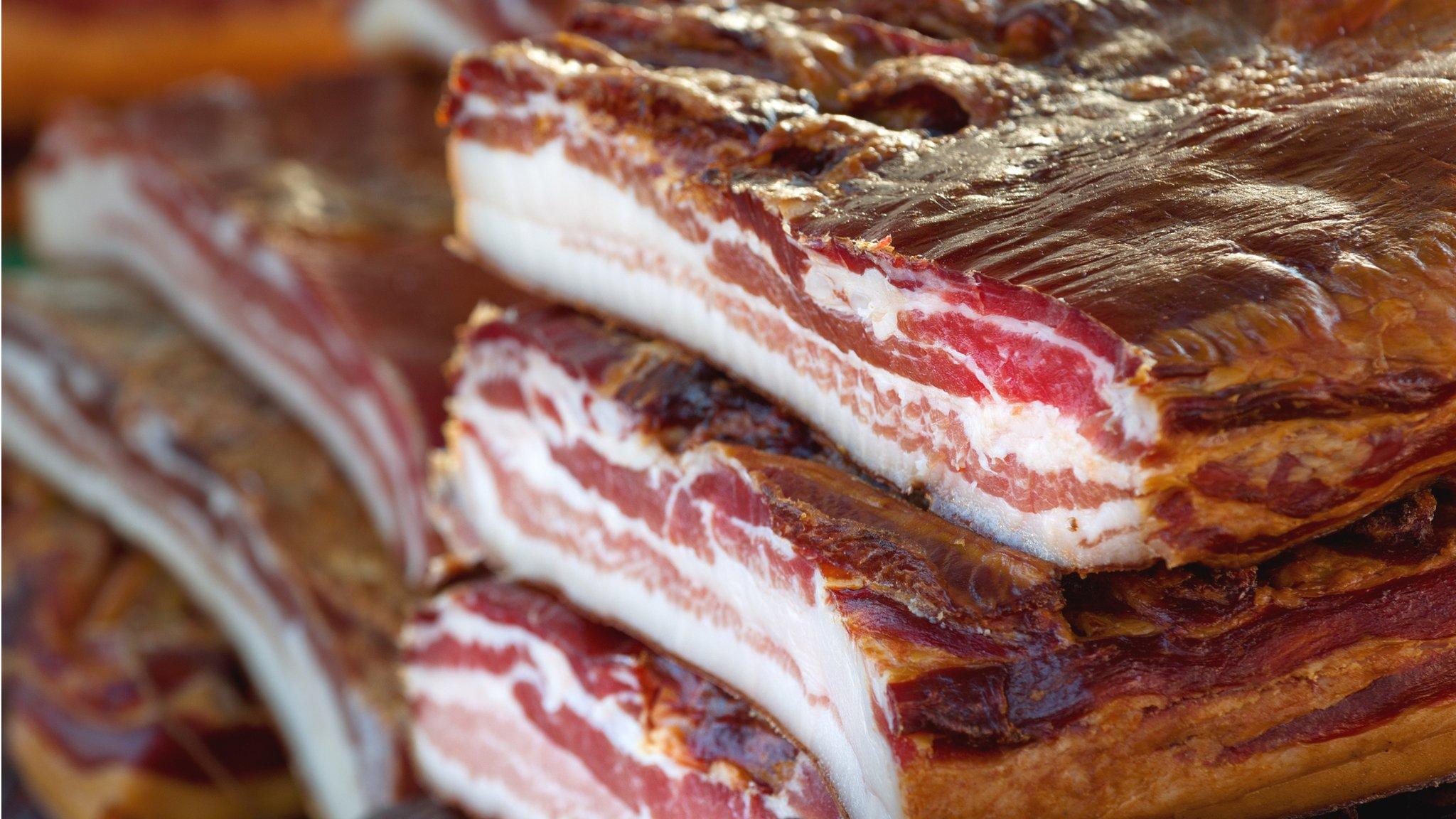
- Published4 January 2016
